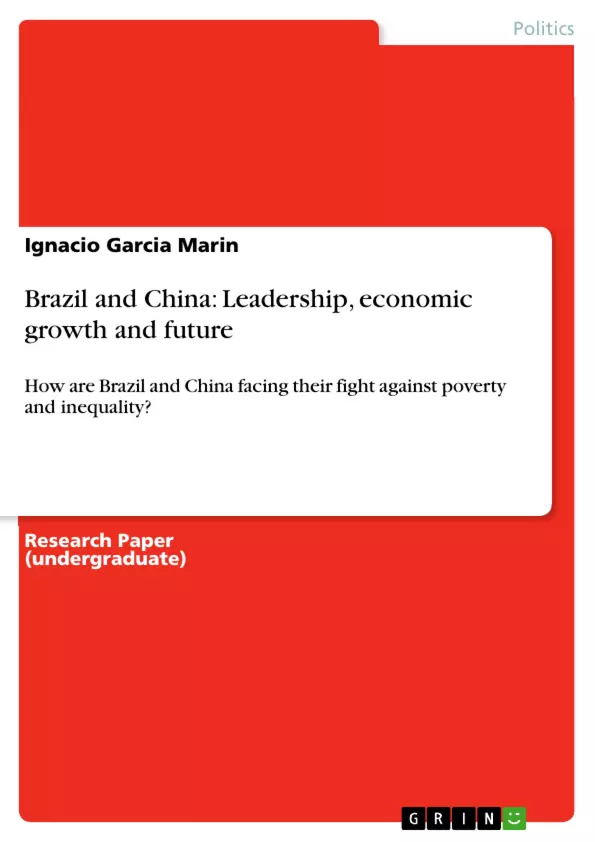During the last decade the world has changed. We started the current century with a clear leader: The US, but only a few years later the global arena is very different. Europe and the United States are fighting against a strong economic crisis, and their internal problems do not help to fix it. Besides, there are new regional leaders, like China, Brazil, India, and Russia. I will pay special attention to the first two, particularly their policies against poverty and inequality.
The comparison between these countries, in concrete Brazil and China is very interesting, since we can see how different capitalist models are facing evident problems: strong economic growth, millions of poor and corruption. Besides, in the case of China, we are talking about a communist dictatorship with capitalist areas.
To begin with I am going to do a short description about the current economic crisis, where I will discuss some ideas considering the different situation between developed and non-developed countries. To analyze the fight against poverty it is important to understand the scenario that surrounds us. Later on I will point out some political questions about the idea that current world is changing the global arena settled after the fall of the USRR. Concluding this section I will introduce to two of the new winners, Brazil and China, and their exclusive club: BRIC with the idea of describe how are these poor countries facing the problem of the poverty. The questions that I am going to answer are How are Brazil and China facing the poverty? What are the priorities of their governments?
Inhaltsverzeichnis (Table of Contents)
- 1 Introduction
- 2 The amazing new order: Brazil and China and the crisis in the North Atlantic countries
- 2.1 The World today. North Atlantic economic crisis and the strength of BRIC: a necessary explication about how the board is changing.
- 2.2. Where are development and progress today? BRIC as a select and promising club
- 3 Brazil: between the strong economic growth and the fight against the poverty.
- 4 China: strong reduction of poverty. Inequality can wait
- 5 Brazil and China: two countries, two models, two priorities
- 6 Conclusions
Zielsetzung und Themenschwerpunkte (Objectives and Key Themes)
This text aims to analyze the fight against poverty and inequality in Brazil and China, providing a comparative perspective on their capitalist models and economic growth. It highlights the contrasting approaches to addressing poverty, inequality, and economic development in these two emerging economies.
- The Global Economic Crisis and its impact on developed and developing countries
- The rise of Brazil and China as new economic powers and their role in the global arena
- Different capitalist models and their effectiveness in achieving economic growth and addressing poverty
- The challenges and opportunities faced by Brazil and China in tackling poverty and inequality
- The implications of these developments for the global economic order
Zusammenfassung der Kapitel (Chapter Summaries)
- Chapter 1: Introduction: This chapter sets the context for the analysis by discussing the changing global economic landscape, with the rise of new economic powers like China and Brazil, and the challenges faced by traditional economic leaders like the United States and Europe. It introduces the focus of the text on comparing the approaches to poverty reduction and economic growth in Brazil and China.
- Chapter 2: The amazing new order: Brazil and China and the crisis in the North Atlantic countries: This chapter explores the current global economic crisis, highlighting the challenges faced by developed countries and the relative resilience of emerging economies. It explains the concept of BRIC countries and their rising influence in the global economy.
- Chapter 3: Brazil: between the strong economic growth and the fight against the poverty.: This chapter focuses on Brazil, examining its recent economic growth and its strategies for addressing poverty and inequality.
- Chapter 4: China: strong reduction of poverty. Inequality can wait: This chapter explores China's remarkable reduction of poverty and its economic performance, discussing its unique political system and economic model. It highlights the challenges posed by growing inequality.
Schlüsselwörter (Keywords)
This text explores the topics of global economic crisis, emerging economies, capitalism in comparison, poverty reduction, inequality, economic growth, BRIC countries, Brazil, China, and their respective political and economic models.
Frequently Asked Questions
What is the main focus of the comparison between Brazil and China?
The text compares how Brazil and China, as emerging economic powers, address poverty and inequality within their respective capitalist models.
What does the term BRIC refer to in this context?
BRIC refers to the group of emerging economies—Brazil, Russia, India, and China—which have gained significant influence in the global arena following the economic crisis in North Atlantic countries.
How has China approached poverty reduction?
China has achieved a strong reduction in poverty through rapid economic growth, though the text notes that addressing inequality has often been deprioritized in favor of growth.
What is the "New World Order" mentioned in the text?
It describes the shift from a US-led global arena to one where regional leaders like the BRIC nations play a central role, especially as Europe and the US face internal economic crises.
Does the text discuss the political systems of these countries?
Yes, it highlights the contrast between Brazil's model and China's system, which it describes as a communist dictatorship with capitalist economic areas.
- Quote paper
- Ignacio Garcia Marin (Author), 2011, Brazil and China: Leadership, economic growth and future, Munich, GRIN Verlag, https://www.grin.com/document/180798



